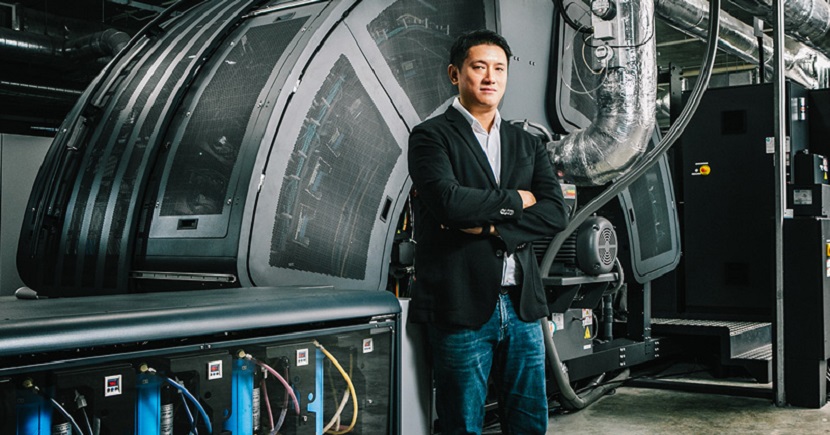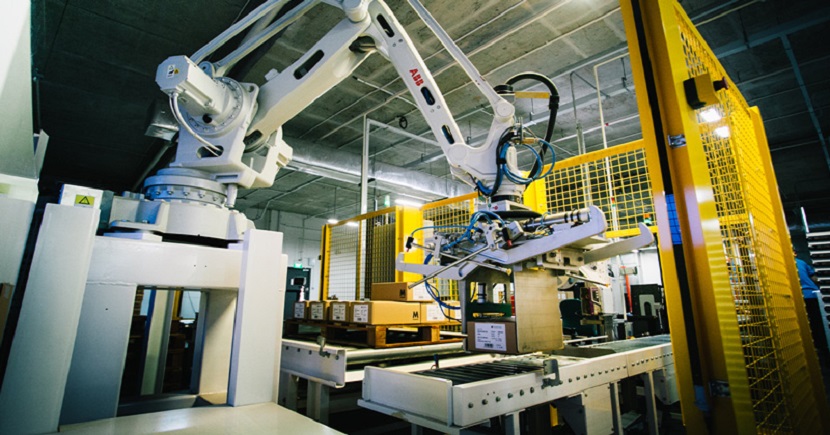First published in The Business Times on 01 September 2020.

Having the fundamentals in place cannot ameliorate all the challenges thrown up by the Covid-19 pandemic, but it can certainly put you a few paces ahead.
Markono Content Solutions Group's managing director Edwin Ng is no stranger to being thrown into the deep end. He joined the family business in 2008 at a time when the tide seemed to be turning against print. Amazon had released the Kindle, its first e-reader in 2007, and a few years later, Apple launched its first iPad in 2010.
"I still felt the industry had a lot of potential. Even though it's traditional, I wanted to create a platform that I and my colleagues could be proud of; I wanted our customers to see us as an industry leader, a thought leader."
He continues: "I was fearful. I thought the iPad and Kindle might spell the end of our business."
Building the fundamentals
That being said, by the mid-2000s, Markono was already a few steps ahead of the competition. The firm was started by Mr Ng's father in 1967 as Kin Keong Printing Company, printing business cards and stationery.
By the time the younger Mr Ng joined the firm, the company was already providing end-to-end print solutions such as pre-press, offset and digital printing, binding and finishing services.
Indeed, his father's decision to adopt digital printing capabilities in the late 1990s was in itself ahead of its time.
But there was still much to be done.
"One of the first things we did when I first joined the company was get the basic processes and systems in place. I think having the housekeeping in place is very important when you want to scale up your company," says Mr Ng.
This ranged from developing their physical and digital flow processes and included basic documentation of workflow processes for new staff.
They also got their Business Continuity Management certification. Having gone through this process has undoubtedly come in handy in recent months, as everyone knew the specific role they had to play when they broke into different teams and started working remotely.
"Our learning curve was less steep because we already had those processes and structures in place. Along the way we had to make amendments, based on the changing situation like border closures and government directives but having these processes helped because we have a common understanding across the different departments."
Developing a flywheel
"In the past, we printed higher volumes and exported to the Western countries. But we've since repositioned our business to focus a lot on academic educational publishers," says Mr Ng.
Mr Ng credits the group's ability to get to where it is on the flywheel effect.
It was his father's decision to invest in digital printing early even when the technology was unreliable.
"Because we were already experienced in the operational aspects of digital printing, we were able to use this technology to help publishers sell longtail books that had low demand. And as we gathered more and more volume, and it became unmanageable for our staff to transact manually, we decided to automate the process."
Now, Markono receives electronic orders direct from the publishers' Enterprise Resource Planning (ERP) system. These orders flow through an internal automated workflow which batches the print jobs according to their technical specifications, before shuttling the job to the right printer.
"So that's our process innovation over the years. We used to do this more manually but as the mix got higher and the volumes got bigger, we started automating different aspects of the workflow," says Mr Ng.

"For our machines, we scouted around to look for what's most suitable for our operations. And, for some of it, we integrated machine parts from different manufacturers."
In 2019 for instance, Markono, with support from Enterprise Singapore, decided to invest in the latest state-of-the-art advanced printing offset printing and digital web printing presses, with automated post-press/finishing equipment. This equipment came from Germany, US and Japan and required in-house integration. As a result, their production capacity has increased by an estimated 30 per cent.
"So now we have a very seamless workflow for digital printing. But it wasn't a one-off thing. You need all the factors to come together - customers' trust and, of course, a certain amount of work volume so you can invest in the right machines."
Keeping up with e-commerce trends
"People still buy books but they buy them online and so the order pattern has changed," explains Mr Ng. "In the past, book distributors might order 50 of each book and put them in their stores. But now because of e-commerce the order pattern becomes very high mix low volume."
Already armed with print-on-demand printing capabilities - Markono boasts one of the most advanced print-on-demand capabilities in South-east Asia which allows them to manage costs efficiently by reducing reliance on rising labour costs - the next logical step was to look at developing their supply chain distribution capabilities.
"Of the top 10 academic publishers, I'd say 70 per cent are our clients. A lot of them are based in the US or UK so we serve as their supply chain hub for the Asia-Pacific region," says Mr Ng.
"Our customers outsource a lot of their warehousing operations to third party logistics providers. So we thought if we onboard that capability and offer it to our customers, we can help them to be even more flexible and nimble."
Moving to their 275,000 sq ft facility in Pioneer Crescent has put them in good stead. With end-to-end printing capabilities including pre-press, offset and digital printing, ad binding and finishing operations, this state-of-the-art warehouse logistics facility also has maximised storage space utilisation with automated storage and retrieval system, as well as improved productivity by using Automated Guided Vehicles (AGVs) for transportation of goods.
"So, for example, if we have 50 books in the warehouse but a customer needs 100, we can just print them on demand and turn it around in two days to fulfil their order," says Mr Ng.
"In the past, the customer would have had to ship the books out of another warehouse in Europe or the US incurring time and money."
On the distribution front meanwhile, their solutions include courier, bulk mailing, international freight, and local transport. They are also able to provide a wide range of value-added services such as shrink-wrapping, kitting, bundling, letter-shipping and poly-bagging.
"So instead of simply competing on price and just manufacturing and printing and then sending everything back to them because our costs are lower, we've positioned ourselves as a resilient and flexible supply chain hub for their operations in APAC," says Mr Ng.
"And I'm proud to say that despite all the challenges thrown up by Covid-19 with the circuit breaker and supply chain shutdown, we haven't had any of our customer orders interrupted."
Taking on Covid-19
Not that Markono is sailing through the pandemic unscathed.
"Our sales have come down because of schools closing and weakness in the consumer market," says Mr Ng. "Being more digitally-ready and having more machinery and automation so we can more easily implement safe distancing on our production floor has helped, but no one is spared."
But while business may have taken a hit, Markono is still focused on growing.
One of the things they've done is scale up their human capital development. During the circuit breaker, they worked closely with the National Trades Union Congress (NTUC) to set up a company training committee (CTC).
This initiative was first unveiled by NTUC in 2019 with the aim of setting up committees in some 1,000 companies in three years. Comprising union leaders and company management, the CTCs' main goal is to help workers upgrade in parallel with their companies' transformation.
They also sent all of their staff for digital awareness and cyber security training. Mr Ng himself signed up for courses on how to use business intelligence tools more effectively.
"Depending on where they are at, we are signing our colleagues up for different kinds of courses so that their roles can evolve with the company and so they can be more effective in their work. The wish is that they can be focused on more value-added things, like being more customer-focused and having more bottom-up innovation," says Mr Ng.
Markono is also one of 18 local companies taking part in the second run of the Scale-up SG programme. The growth partnership programme by Enterprise Singapore is a two-and-a-half year programme where companies can tap the expertise and networks of Enterprise Singapore and partners such as McKinsey & Company and PwC Singapore to support their growth objectives. Companies also have the opportunity to learn from one another and may also partner up executive business plans together.
Markono is paired with McKinsey and is currently in the third stage - the accelerate stage - of the programme.
"Unfortunately, Covid-19 has put some of the plans on hold, but some of the things like digital transformation, we are still pressing ahead."
Dubbed Markono 4.0, the company, with ESG's support, is embarking on Industry 4.0 projects such as rules-based workflow automation, scheduling and process optimisation and business intelligence through data capture and analytics.
Markono is currently working with the Institute of Technical Education (ITE) to put sensors on their machines to collect different types of operational data.
"With data, the possibilities of what you can do are endless. You can collect a whole lot of data but the most important thing is to make sense of it and leverage it, right?
"Everyone talks about analytics and throws around fancy terms like business intelligence and Industry 4.0. But to really harness the potential of this data and make use of it, I think we still have some way to go. But we're on the journey now."
Finding new opportunities
It's not just about strengthening their operations. During the lockdown, the team also came up with ways to reach out to the local publishing industry.
"During the lockdown, with all the bookstores closed, I told my guys to think out of the box and come up with ways to address some of the problems faced by the industry," says Mr Ng.
Enterprise Singapore helped link them up with the Singapore Book Publishers Association and were also involved in the different phone calls and webinars organised for Markono to pitch their solution - print on demand servicing, warehousing and distribution services, and the ability to list on multiple e-commerce marketplaces.
"We've been sharing with them our business model and had two customers come on board to share their experiences with these Singapore-based publishers," says Mr Ng.
He admits this new venture is slow-going, as many smaller publishers are still scrambling to tackle the challenges thrown up by Covid-19. But, "we couldn't travel so we came together to try new things. It might be successful, it might not be, but at least we try!"
They might even take this model regional.
"I won't tell you all the specifics, but we do want to further increase all activities within the publishing supply chain to grow our business," says Mr Ng. " We also want to have more of a regional footprint; we deliver regionally, but all our operations are still in Singapore."
He adds: "I think in Singapore we are very fortunate. If companies are willing to transform and invest, the government is there to provide support. They've supported us not just in terms of our investments, they've also supported us with our business plans and the Scale-up SG programme. So I think as long as there's a willingness to transform, automate, digitise, learn and upskill, the government is quite supportive as long as the company has genuine intentions."


